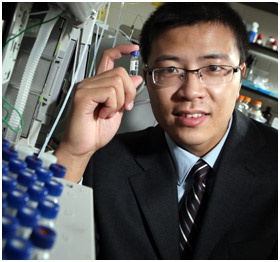Mar 4 2009
A student at Rensselaer Polytechnic Institute has developed a new method for harnessing the enormous potential of nanoparticles, which could lead to a new generation of medical devices, drug delivery technologies, and other applications.

Yuehua “Tony” Yu, a doctoral student in Rensselaer’s Department of Chemistry and Chemical Biology, is the first researcher to create binary guanosine gels, or G-gels, with unique, highly tunable properties. The discovery, which could enable a practical, cost-effective, and scalable method for better exploiting the beneficial properties of many nanoparticles, earned Yu the $30,000 Lemelson-Rensselaer Student Prize.
“Future global challenges will demand leaders who are not only skilled scientists and engineers, but also innovators adept at problem solving and out-of-the-box thinking. The Lemelson-Rensselaer Student Prize recognizes ingenuity and inventiveness, while inspiring students toward excellence,” said Rensselaer President Shirley Ann Jackson. “Yuehua Yu is a shining example of this innovative spirit. A keen thinker and passionate researcher, he enjoys a rich understanding of technology, as well as a sharply focused determination to use his abilities for the betterment of all. We celebrate his achievement, and applaud all of the finalists for their dedication and effort. May they, and all of us, continue to foster a healthy scientific curiosity, and an unyielding drive for progress.”
Yu is the third recipient of the $30,000 Lemelson-Rensselaer Student Prize. The prize, first given in 2007, is awarded annually to a Rensselaer senior or graduate student who has created or improved a product or process, applied a technology in a new way, redesigned a system or in other ways demonstrated remarkable inventiveness.
For videos and photos of the winner and award finalists, as well as a Webcast of the announcement ceremony, please visit: www.eng.rpi.edu/lemelson.
Helping hand for nanotech
Breakthroughs in nanotechnology hold the promise of touching and revolutionizing medicine, energy production and storage, water purification, electronics, and a host of other diverse fields. A key challenge for many researchers working with nanoparticles is simply getting the nanoscopic materials — some of which measure only a few billionths of a meter in length — where they need to go. Using liquid to disperse nanoparticles seems like a natural fit, but most materials have a tendency to aggregate, or clump together, when placed in liquids. Current solutions for properly dispersing nanomaterials in liquid often impact the materials’ properties, cause irreversible damage, or result in concentrations too low to be effective.
To address this problem, Yu investigated guanosine gels, or “G-gels.” Yu was the first researcher to develop a G-gel comprised of more than one guanosine compound. He discovered that some of these new binary G-gels were liquid at low temperature, but formed firm gels when heated to room or body temperature. Further study showed that binary G-gels were highly tunable.
This ability to easily convert the G-gels from liquid to gel, and back again, was a natural fit for the reliable delivery of nanoparticles. Yu’s G-gels proved to be an inexpensive and scalable means to gently, nondestructively disperse single-walled carbon nanotubes (SWNTs) and other nanoparticles at a high concentration. By simply controlling the temperature, Yu engineered G-gels that can selectively solubilize specific SWNTs, and then be easily removed from the site after the SWNTs are in place. The gels can be tuned to selectively solubilize SWNTs based on different properties, including conductivity and structure.
Another key application of G-gels is their ability to preserve, and even restore, enzyme activity. Because they begin as liquids and form gels at body temperature, the G-gels could be used to encapsulate live cells, enzymes, or other materials for delivery into the human body, with potential applications in drug and gene delivery, as well as implantable devices. Yu has also demonstrated the ability of G-gels to keep certain enzymes stable for months at room temperature, which has captured the attention of cosmetics and sunscreen companies.